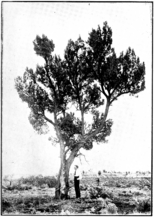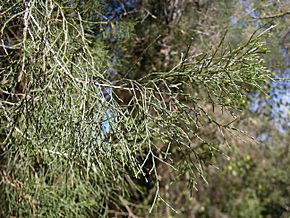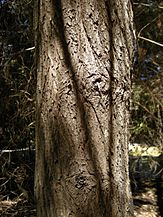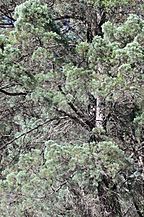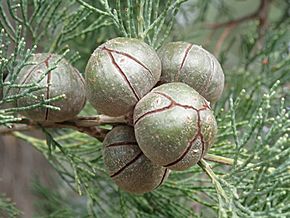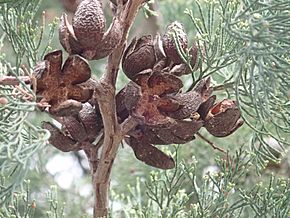White cypress facts for kids
Quick facts for kids White cypress |
|
|---|---|
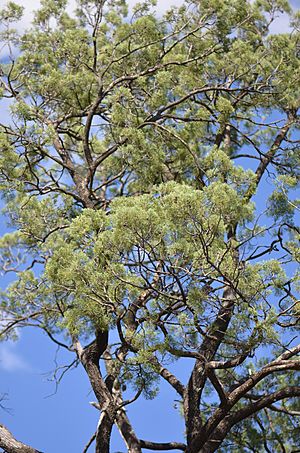 |
|
| Callitris columellaris (C. glaucophylla) | |
| Conservation status | |
| Scientific classification |
|
| Kingdom: | Plantae |
| Clade: | Tracheophytes |
| Division: | Pinophyta |
| Class: | Pinopsida |
| Order: | Pinales |
| Family: | Cupressaceae |
| Genus: | Callitris |
| Species: |
C. columellaris
|
| Binomial name | |
| Callitris columellaris |
|
| Script error: The function "autoWithCaption" does not exist. | |
| Synonyms | |
|
Callitris arenosa A.Cunn. ex R.T.Baker & H.G.Sm. |
|
Script error: No such module "Check for conflicting parameters".
The White Cypress-pine (scientific name: Callitris columellaris) is a type of conifer tree. It belongs to the cypress family and is found in most parts of Australia. People also call it the Murray River Cypress-pine or Northern Cypress-pine. This tree has also started growing naturally in places like Hawaii and southern Florida.
Contents
What Does the White Cypress-Pine Look Like?
The White Cypress-pine is an evergreen tree, meaning it keeps its leaves all year round. It usually grows to be about 4 to 12 meters (about 13 to 39 feet) tall. Sometimes, it can even reach 20 meters (about 65 feet) high. The main trunk can be up to 50 centimeters (about 20 inches) wide.
Its leaves are very small and flat, like scales. They are usually 2 to 6 millimeters long and about half a millimeter wide. These tiny leaves grow in groups of three around very thin branches.
The tree produces round cones. These cones are about 1 to 2 centimeters (less than an inch) across. They have six triangle-shaped scales. When the cones are ready, they open up to release their seeds.
How Scientists Classify This Tree
Scientists sometimes have different ideas about how to group plants. For the White Cypress-pine, some experts think it should be divided into three separate species. They look at things like the color of the leaves and the size of the cones. For example, trees with green leaves are often found on the east coast of Australia. Trees with a more blue-green (glaucous) color are found more inland.
However, other scientists believe that all these trees are just one species. They say that the leaf color and cone size can change a lot, even among trees growing in the same area. This makes it hard to tell them apart as different species. So, while some names like Callitris glaucophylla or Callitris intratropica might be used, many still consider them all to be Callitris columellaris.
Pollination and Life Cycle
The White Cypress-pine has an interesting way of spreading its pollen. A writer named Eric Rolls once described it. He said that when hundreds of cones are ready, they "go off together with a sharp crack." This makes them shoot brown pollen about a meter (over 3 feet) into the air. The whole tree can even shake when this happens! This process helps the tree reproduce by spreading its seeds.
Gallery
See also
 In Spanish: Callitris columellaris para niños
In Spanish: Callitris columellaris para niños
 | Emma Amos |
 | Edward Mitchell Bannister |
 | Larry D. Alexander |
 | Ernie Barnes |



